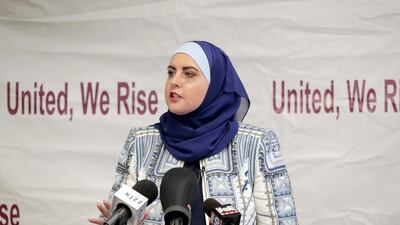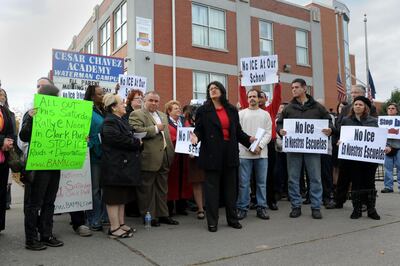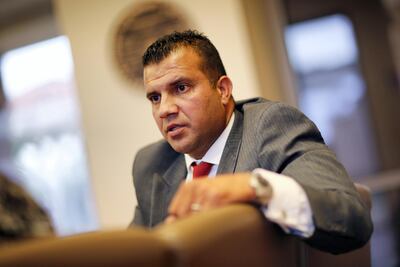Like many communities under threat, American Muslims have tended to keep their heads down when times were hard, going about their business in the hope that quietly contributing to society was enough. Not any more, according to Kareem Kandil, an engineer from Pittsburgh.
“On the national level, Trump sort of proved that wrong,” he said, describing how the election of Donald Trump had given vent to a xenophobic and nativist view that Muslims were dangerous outsiders.
“I want to turn that around,” he said.
When voters turn out next month for the Democratic primary to select the party’s candidates for the Pennsylvania House of Representatives, his name will be on the ballot.
In his first time running for office, Mr Kandil joins what has been nicknamed a “blue Muslim wave” inspired by a reaction against Mr Trump.
_______________
Read more:
Trump warns countries that do not back World Cup bid
Democratic Party sue Russia and Trump campaign for allegedly disrupting 2016 election
_______________
As many as 120 American Muslims are standing in elections at every level of politics – from the senate to school boards – according to a tally maintained by Jetpac, a political advocacy group offering them training and support.
The past week alone illustrates the issues they face. On Wednesday, Supreme Court justices hinted they would not overturn Mr Trump's restrictions on entry of nationals from eight countries, even though critics say it amounts to a "Muslim ban". A day later, the Senate confirmed Mike Pompeo as secretary of state, despite concerns about his links to anti-Muslim figures and history of saying that Islamic leaders had a special responsibility to denounce terrorism.
Mr Kandil said he hoped his policies of single-payer health care and stricter environmental regulations would appeal to all voters, but added: “It seems to me that there is a new need for immigrant communities, Muslim communities and minorities to speak for themselves instead of waiting for someone else to speak for them.”
American Muslims currently have a low profile in politics. Muslims hold just two of the 535 seats in Congress, despite being drawn from a population of 3.3 million people.
Only 44 per cent of American Muslims say they voted in the 2016 election, well below the national turnout of 58 per cent of registered voters.
That might be changing, as a new generation of political figures draws energy from the election of Donald Trump.
Shaun Kennedy, co-founder of Jetpac, said the organisation had a waiting list of more than 100 people.
“Donald Trump is certainly being a catalyst, his anti-Muslim policies, his anti-Muslim cabinet, the Twitter storms that he goes on, have certainly made Muslims realise how vulnerable they are and prompted them to take this final step, but I think it has been moving towards this point for a while,” he said.
His organisation offers training and guidance for campaign novices. Its “playbook” includes the fundamentals of strategy, fundraising and social media outreach. At its core, is a philosophy that focuses on maximising the often overlooked Muslim vote, and encouraging turnout instead of the more orthodox approach of persuading frequent voters to switch sides.
“It is about people-powered fundraising, small donations – not accepting special interests’ money – to try to build a campaign and a platform that really speaks to people who at the moment are disenfranchised,” he said.
It is already getting results. Of its 28 alumni, 24 have run for office and 12 have won. So far.
At the same time, there have been plenty of reminders of the challenges.
In Massachusetts last year, Sarah Khatib ran for one of two seats on the Walpole town planning board. The three-way race made headlines for the wrong reasons.
One of the candidates, George Hodges, was accused of Islamophobia and asked to stand aside after it emerged he had posted inflammatory comments on his Facebook page. “If there’s a rag on your head, you want Americans dead,” read one post made about six months before the election.
He insisted the comment had been taken out of context but finished a distant third.
Some candidates are making their impact at a local level, on party committees or town councils. But a slew of runners have their eyes on national prizes.
Jesse Sbaih in Nevada and Deedra Abboud in Arizona are both campaigning to become the first Muslim senator.
And Sameena Mustafa in Illinois, Nadia Hashimi in Maryland, or Rashida Tlaib and Fayrouz Saad in Michigan could become the first Muslim women in Congress.
None faces an easy ride. Ms Abboud, a lawyer who also went through Jetpac’s training, has faced abusive comments posted to her campaign website. And Mr Sbaih has complained of prejudice and obstruction even within his own Democratic Party.
They also face competitive primaries before their name reaches the ballot paper.
Even unsuccessful campaigns can improve visibility and remind Americans that minorities are doing their bit, according to Mansoor Shams. He is better known as the “Muslim marine” and travels the US educating Americans about his religion and explaining how it informed his decision to serve in the country’s armed forces.
“The fact of the matter is that if we want to see change or a change of direction we have to step out of our comfort zones, we have to put ourselves out there,” he said.
“Until we are involved – in whatever capacity that might be – you don’t have as much power.”



